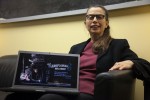This will be the sixth year that two rival film schools – UCLA and USC – have come together to discuss the evolving entertainment industry.
The annual “Transforming Hollywood” conference was co-founded by Denise Mann, head of the UCLA School of Theater, Film and Television’s Producers Program, and Henry Jenkins, the provost’s professor of communication, journalism and cinematic arts at USC.
“There’s so little dialogue across the two schools,” Jenkins said. “If we created something together, we’d have a killer combination.”
On Friday, “Transforming Hollywood 6: Alternative Realities, World Building and Immersive Entertainment” will be held in the James Bridges Theater. The daylong event will connect scholars and professionals to focus on digital technology and virtual reality in film. It will include four panels and a conversation with Academy Award-winning producer Jon Landau.
An example of virtual reality is putting on goggles to be inside a fictionalized movie world instead of the real world, Mann said. Alternatively, augmented reality blends fictional and real worlds through projections or holograms that appear to be part of the current reality. The conference will focus on both types of immersive entertainment, she said.
Mann initially became intrigued by this topic through an exhibit called “Ascend the Wall” at the 2014 South by Southwest festival. Participants of this “Game of Thrones”-themed display put on goggles and a headset, she said, and stepped into an elevator shaft. The technology was designed to make the attendees feel like they were being shot up 700 feet and then looking over the edge of “The Wall.”
“That fascinated me because it sounded so fantastic, somewhere between a roller coaster ride and being really immersed in a film,” Mann said. “It’s not just we want to be witnesses to a particular story; we want to be embodied in a particular kind of space.”
The first panel, “Prototype the Planet,” will be moderated by Jenkins. He said there are more than 100 years of immersive entertainment history and the panelists will give a historical perspective, discussing why people are drawn to these technologies and why early versions didn’t last.
“The most interesting part of this year is the inclusion of historians, because there’s a tendency in the entertainment industry to talk about virtual reality as if it was invented yesterday and is all about the future,” Jenkins said.
Jenkins said the panel will bring in urban planners to talk about conceiving not a story or character, but an entire world to thrust the audience into, known as world-building.
“We seem to have just hit a moment, an inflection point, where suddenly the industry is looking at these technologies again,” Jenkins said. “It seems like an apropos time to compare notes, to reflect on what we’re learning, to bring people who are working in very different spaces together.”
In the panel “Brand New Vistas,” Mann will focus on branding and consider who is paying for new content for these technologies, which are not yet available for public sale. She said sometimes artists raise money themselves, but are often hired by companies to experiment with advertisements.
“I’ve always been interested in this intersection of the artistic space and the promotional space,” Mann said. “It’s a different monetization model than Hollywood has engineered.”
The final conversation is between Landau, producer of “Avatar” and “Titanic,” and UCLA film lecturer and producer Tom Nunan. Jenkins said Landau’s films are perfect examples of transformative stories, achieved in part by sophisticated 3-D modeling and digital simulations.
During the moderated Q&A, Landau said he will talk about world-building and how “Avatar” is becoming a prospective brand with graphic novels, theme parks and sequels. He said filmmakers can improve any story with technology, like using software from the provider Avid to edit in a non-linear digital fashion, which he said allows movies like “Avatar” to be made.
“We’re storytellers,” Landau said. “And the best way to advance the industry from a technological standpoint is not to say, ‘There’s a technology, let’s find a story that fits it,’ but to say, ‘Here’s a story we want to tell’ and figure out ways to adapt and improve and advance technology to allow you to tell those stories.”
Landau said he hopes the “Transforming Hollywood 6” conference helps people realize the shared communal movie experience is still prevalent, as theaters offer escapism. He said one medium alone might not be enough to realize filmmakers’ visions, but digital technologies can help Hollywood transport viewers to spaces they couldn’t otherwise envision.
Jenkins said the purpose of the conference is to both describe the changes in Hollywood and to provoke them, evoking the transformation by gathering a variety of people, which he described as cross-pollinating.
Audiences at Friday’s event will likely include professors, students, industry professionals, journalists, technological innovators, historians and members of the independent creative community, Jenkins and Mann said.
“It’s about empowering people to let them know that their imagination is the only limitation today,” Landau said.
